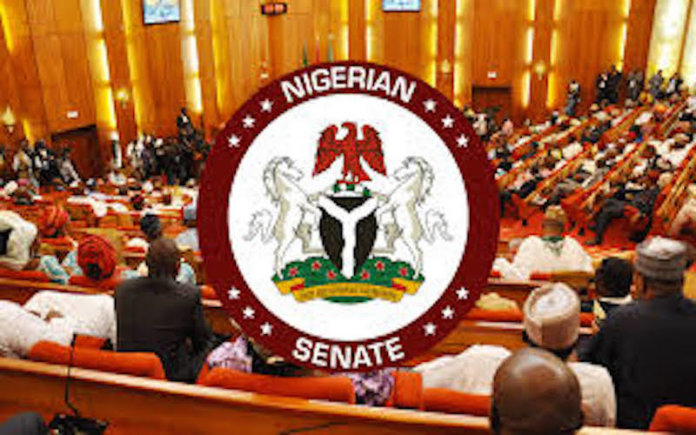Senate Approves Direct Primaries For Political Parties, Empowers INEC On E-Transmission

The Senate has empowered the Independent National Electoral Commission (INEC) as the sole authority to determine the mode of transmission of results during elections in the country.
The pronouncement by the Senate on Tuesday follows several criticisms that had trailed their earlier decision that INEC may consider the electronic transmission of results provided national network coverage is adjudged to be adequate and secure by the Nigerian Communications Commission and approved by the National Assembly.
The Senate had also approved direct primaries for aspirants to all elective positions by the political parties.
The chamber approved Clause 87 to read “a political party seeking to nominate candidates for elections under this bill shall hold direct primaries for aspirants to all elective positions, which shall be monitored by the Commission.”
The amendments were made on Tuesday by the Senate to some clauses of the Electoral Act (Repeal and Re-enactment) bill 2021, which were passed on July 15, 2021.
Under a new amendment of Clause 52 (2) of the Electoral Act Amendment Bill, the Senate resolved that “voting at an election and transmission of results under this Bill shall be in accordance with the procedure determined by the Commission, which may include electronic voting.”
The move was part of decisions taken by the Senate when it passed a bill to re-commit some clauses in the Electoral Act Repeal and Re-Enactment bill which was earlier passed about 3 months ago separately by the Senate and House of Representatives.
The Senate Majority Leader, Yahaya Abdullahi, while presenting a motion for the amendment before the Senate, said after a critical examination of the Bill by the Senate Committee on INEC, some fundamental issues were observed which required fresh legislative action.
He listed the clauses that required legislative action to include 43,52,62,87.
Section 87 deals with the method of primaries to be adopted by political parties.
The Senate had earlier adopted during the amendment of the electoral act that parties should adopt either direct or indirect primaries.
However, based on the observation by its INEC Committee, the lawmakers supported direct primaries while some others did not.
Senator Adamu AlIero supported direct primaries arguing that it will strengthen and deepen democracy and will make the electoral process transparent and will make it difficult for money bags who will try to hijack the process.
Senator Adamu AlIero, who argued in favour of direct primaries, said that it will strengthen and deepen democracy and will make the electoral process transparent.
However, Senator Smart Adeyemi, who rejected direct primaries, said that indirect primaries is better for the country because the majority of party members are illiterate and they will need enlightenment if they are going to be asked to come out and vote.
The pronouncement by the Senate on Tuesday follows several criticisms that had trailed their earlier decision that INEC may consider the electronic transmission of results provided national network coverage is adjudged to be adequate and secure by the Nigerian Communications Commission and approved by the National Assembly.
The Senate had also approved direct primaries for aspirants to all elective positions by the political parties.
The chamber approved Clause 87 to read “a political party seeking to nominate candidates for elections under this bill shall hold direct primaries for aspirants to all elective positions, which shall be monitored by the Commission.”
The amendments were made on Tuesday by the Senate to some clauses of the Electoral Act (Repeal and Re-enactment) bill 2021, which were passed on July 15, 2021.
Under a new amendment of Clause 52 (2) of the Electoral Act Amendment Bill, the Senate resolved that “voting at an election and transmission of results under this Bill shall be in accordance with the procedure determined by the Commission, which may include electronic voting.”
The move was part of decisions taken by the Senate when it passed a bill to re-commit some clauses in the Electoral Act Repeal and Re-Enactment bill which was earlier passed about 3 months ago separately by the Senate and House of Representatives.
The Senate Majority Leader, Yahaya Abdullahi, while presenting a motion for the amendment before the Senate, said after a critical examination of the Bill by the Senate Committee on INEC, some fundamental issues were observed which required fresh legislative action.
He listed the clauses that required legislative action to include 43,52,62,87.
Section 87 deals with the method of primaries to be adopted by political parties.
The Senate had earlier adopted during the amendment of the electoral act that parties should adopt either direct or indirect primaries.
However, based on the observation by its INEC Committee, the lawmakers supported direct primaries while some others did not.
Senator Adamu AlIero supported direct primaries arguing that it will strengthen and deepen democracy and will make the electoral process transparent and will make it difficult for money bags who will try to hijack the process.
Senator Adamu AlIero, who argued in favour of direct primaries, said that it will strengthen and deepen democracy and will make the electoral process transparent.
However, Senator Smart Adeyemi, who rejected direct primaries, said that indirect primaries is better for the country because the majority of party members are illiterate and they will need enlightenment if they are going to be asked to come out and vote.
He added that indirect primaries are cheaper to conduct.
After the debate, the majority of lawmakers voted in favour of direct primaries and it was adopted by the Senate.
Recall that earlier in July, the Nigerian Senate broke its silence on the electronic transmission of results for the Electoral Bill as it insisted that INEC may only electronically transmit election results if the Nigerian Communications Commission (NCC) endorses the mode of electronic transfer as safe and secure.
This drew a lot of criticisms from many Nigerians and stakeholders in the electoral process. (Nairametrics)
After the debate, the majority of lawmakers voted in favour of direct primaries and it was adopted by the Senate.
Recall that earlier in July, the Nigerian Senate broke its silence on the electronic transmission of results for the Electoral Bill as it insisted that INEC may only electronically transmit election results if the Nigerian Communications Commission (NCC) endorses the mode of electronic transfer as safe and secure.
This drew a lot of criticisms from many Nigerians and stakeholders in the electoral process. (Nairametrics)







